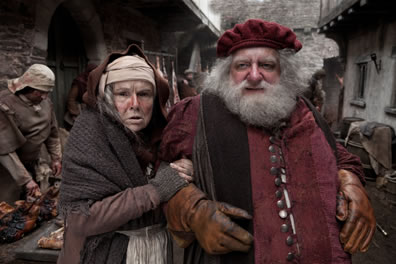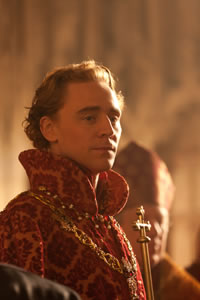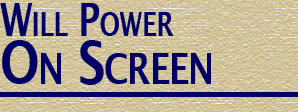The Hollow Crown: Henry IV, Part Two
Falstaff Diminished, This Play Is Built on Irons
Neal Street Productions, NBC/Universal International, WNET THIRTEEN (2012)
Directed by Richard Eyre. Jeremy Irons, Tom Hiddleston, Simon Russell Beale, Alun Armstrong, Julie Walters, Maxine Peake, Henry Faber, Geoffrey Palmer

Mistress Quickly (Julie Walters) and Falstaff (Simon Russell Beale) walk down a street in Eastcheap in the production of Henry IV, Part Two, filmed as part of the series, The Hollow Crown. Below, Tom Hiddleston as the newly crowned King Henry V. Photos by Joss Barratt, Neal Street Productions.
People who bemoan Hollywood's addiction to sequels overlook the fact that the acknowledged "greatest writer ever" had something of an addiction to sequels. And for the same reason—money. William Shakespeare's first box office smashes were his Henry VI plays, in which he either wrote three sequels or a prequel and two sequels (scholars are divided) culminating with one of his biggest hits ever, Richard III. Unable to take the series further—Richard's death ended the War of the Roses—and apparently writing a box office dud with the underrated King John, Shakespeare took on the origin story of England's internecine war for his next foray into history and achieved another success with Richard II and the three sequels following it.
This tetralogy most mirrors the current Hollywood process. Shakespeare, perhaps in a hurry, composed his first Henry IV play without the carefully constructed poetry of the Richard II that came before but with a flush of great characters and obviously looking ahead toward a Part Two. But both external and internal evidence suggest that Falstaff (originally named Oldcastle) in the first Henry IV play took London culture by storm, so Henry IV, Part Two, shifts its focus almost entirely onto the fat knight. Though promising his audience in that play's epilogue that he would bring back Falstaff for a part three, Shakespeare wisely rebooted the franchise with a new construct (the Chorus format) and a renewed focus on Prince Hal, now titular character of Henry V. Meantime, Falstaff got his own play, the pure comedy, The Merry Wives of Windsor.
All of this lays out the challenge facing the producers of The Hollow Crown, the cinematic-quality broadcasts of the four history plays that are scheduled to air on PBS Friday nights beginning Sept. 20 (check local listings). They perceived the tetralogy as the bloody history of England's crown, from the deposition and murder of Richard II through the rebellions of Henry IV's reign to the expansionist policies of Henry V. Henry IV, Part Two, is something of an anomaly in this series with its preponderance of the merry, old, fat knight.
Richard Eyre, director of the two Henry IV installments, meets this challenge by severely cutting Falstaff's comic scenes to bring the production home at a sharp two hours, dropping Falstaff's soliloquys altogether and tamping down the humor in what's left (Rumour is also cut, as is the epilogue). This is no great loss when it comes to Falstaff, despite the solid performance of Simon Russell Beale, but we lose the wicked satire that is the character of Pistol and the charming fun of the Gloucestershire scenes with Justice Shallow and Silence. Act 3, Scene 2, the great scene in which Falstaff drafts his army for the Yorkshire campaign, one of Shakespeare's funniest set pieces, remains mostly intact, but it has been turned bittersweet to conform more to Eyre's overall fatalistic mood of this production. "A man can die but once: we owe a death," says Feeble (Tom Cornish), who has no financial means to buy his way out of the draft. "If it be my destiny, so: if it be not, so." To this, Bardolph (Tom Georgeson) replies in full sincerity, "Well said. Thou art a good fellow."
For Falstaff, the fatalism is the recognition of his physical end while he remains blind (or, perhaps, oblivious) to his political end. In Gloucestershire, the funny, reminiscent ramblings of Shallow become a scant but sad nostalgia, to which Falstaff commiserates with "We have heard the chimes at midnight." In his love scene with Doll Tearsheet (Maxine Peake), Falstaff repeats the line, "I am old. I am old," in clear reference to his erectile dysfunction. Spying on this scene from the attic above, Poins (David Dawson) gleans much delight from Falstaff's inability to perform, though Prince Hal watches with an expression of pity.
In my opinion, the play's comedy, both the rhetorical humor and slapstick, does not detract whatsoever from the play's more serious themes and its dangerous undercurrent of still-fomenting rebellion and Prince John's (Henry Faber) devious dealing with the rebel lords. For some reason, modern directors (with a few exceptions, such as Jim Warren at the American Shakespeare Center and Joss Whedon of Buffy-Angel-Firefly-Avengers fame) can't seem to grasp Shakespeare's skills at reconciling what's uproariously funny with what's incredibly tragic in the same stream of consciousness—though, really, that's life.
Whether Eyre cannot or simply chose not to embrace the play's comic tangents, his course with this play does have a definite upside, as both the thematic focus and production spotlight remain on the title character. Jeremy Irons reprises the role he plays so brilliantly in Part One and raises his own bar even higher as he delves into a king whose undisclosed illness (and deep sense of guilt) racks him in pain, frailty, and insomnia. Shakespeare doesn't bring in his titular character until Act 3, Scene 1, but Eyre shuffles Henry's scenes around so that he sustains a presence throughout the play, and these interpolations prove to be strengths in this production. Henry's inquiry of his other sons about Hal's whereabouts has been moved from 4.2 to the film's third scene. That 3.1 scene is divided in two. First, the insomniac king gets out of his bed and meanders through the palace until he ends up on his throne, all the while speaking the "Uneasy lies the head that wears a crown" speech. Then, after a scene at the tavern, we are back in 3.1 with the nobles waking the king, still in his bedclothes, sitting on his throne. With his final sickness, Henry clutches the crown and carries it as he is led to the bedchamber. We next see him sleeping with the crown as if it were a teddy bear.
 Tom Hiddleston continues in the role of Hal, and though his performance is nothing to fault, it doesn't stand out so much; in fact, Faber as his younger brother, Prince John, is a much more commanding presence. But Hiddleston is herein imitating the sun, for when he gets his moment at the play's climax, he is to be more wondered at. Thinking his father dead, Hiddleston's Hal takes the crown, walks to the throne room and, sitting there, places the crown on his own head and breaks down in tears. Why is he crying? At the loss of his father? At the realization that now he is king? Perhaps what he tells his father later is the real truth: "Coming to look on you, thinking you dead, and dead almost, my liege, to think you were." All Hal wanted was his father. All Henry wanted was his son, and thinking that his son can't wait until after his death to become king, Irons' Henry unleashes a mesmerizingly torrid rebuke on Hal until the father is physically, emotionally, and psychologically spent. This passage boasts the most sensational acting in the entire Hollow Crown series as Irons and Hiddleston portray father and son who, for all these years, wanted only to connect. When Hal at last convinces Henry of his love, we get a real father-son moment as Henry imparts some final political lessons on his son. Henry concludes by placing the crown on Hal's head and then falls into his final sickness, so that the last thing he sees is Hal as king.
Tom Hiddleston continues in the role of Hal, and though his performance is nothing to fault, it doesn't stand out so much; in fact, Faber as his younger brother, Prince John, is a much more commanding presence. But Hiddleston is herein imitating the sun, for when he gets his moment at the play's climax, he is to be more wondered at. Thinking his father dead, Hiddleston's Hal takes the crown, walks to the throne room and, sitting there, places the crown on his own head and breaks down in tears. Why is he crying? At the loss of his father? At the realization that now he is king? Perhaps what he tells his father later is the real truth: "Coming to look on you, thinking you dead, and dead almost, my liege, to think you were." All Hal wanted was his father. All Henry wanted was his son, and thinking that his son can't wait until after his death to become king, Irons' Henry unleashes a mesmerizingly torrid rebuke on Hal until the father is physically, emotionally, and psychologically spent. This passage boasts the most sensational acting in the entire Hollow Crown series as Irons and Hiddleston portray father and son who, for all these years, wanted only to connect. When Hal at last convinces Henry of his love, we get a real father-son moment as Henry imparts some final political lessons on his son. Henry concludes by placing the crown on Hal's head and then falls into his final sickness, so that the last thing he sees is Hal as king.
The production still must run through Hal's ultimate banishment of Falstaff, but these proceedings are stiffly formal and not as heart-tugging as they could be, though the production ends with a freeze-frame on Falstaff being arrested. A more moving scene is Hal's interaction with his brothers after their father's death, and then his turn on the Lord Chief Justice (Geoffrey Palmer), the legal authority who had disciplined Hal in his wayward youth. Everybody, including the Lord Chief Justice himself, are sure he's about to be cashiered, or worse, upon Hal's ascending the throne, but the new king instead thanks the Lord Chief Justice and insists he remain in his post.
However, Eyre in this scene cuts out a key couple of lines in Hal's speech: "You shall be as a father to my youth, my voice shall sound as you do prompt mine ear, and I will stoop and humble my intents to your well-practiced wise directions." In Shakespeare's version, Hal adopts yet another surrogate father, having lost King Henry and intending to banish Falstaff. In Eyre's version, though, Hal no longer needs a father; his father left him with a wisdom that, in the play to come that will bear his name, leads Henry V to doubling the crowns his father had won.
Eric Minton
September 12, 2013
Comment: e-mail [email protected]
Start a discussion in the Bardroom



 Find additional Shakespeareances
Find additional Shakespeareances